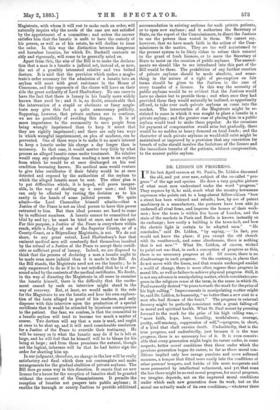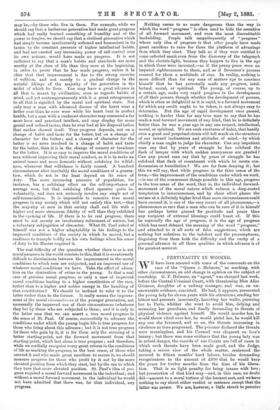DR. LIDDON ON PROGRESS.
IN his last April sermon at St. Paul's, Dr. Liddon discussed the old, and yet ever new, subject of the so-called " progress " of the age and species. He drew a very graphic picture of what most men understand under the word "progress." They express by it, he said, much what the country townsman expresses who points out to a long-absent fellow-citizen "how a street has been widened and rebuilt ; how, by use of patent machinery in a manufactory, the partners have been able to undersell all rival firms, and improve the homes of their workmen ; how the town is within five hours of London, and the state of the markets in Paris and Berlin is known instantly on its exchange; how costly a building is the town-hall, and how the electric light is certain to be adopted soon." "He concludes," said Dr. Liddon, "by saying, — d In fact, you would not know the place ; if you except the old church with its weathercock, and some almshouses, there is nothing that is not new.'" What Dr. Liddon, of course, wished to point out was that, in such a conception of progress as this, there is no necessary progress at all. Of course, there is no disadvantage in such progress. On the contrary, in places that do not move with the times, and that remain unchanged amidst a world of change, there is more often regress than progress in moral life, as well as failure to achieve physical progress. Still, it is not any advance in manipulating matter, which constitutes progress in the religious sense of the term, in the sense in which St. Paul earnestly desired "to press towards the mark for the prize of his high calling." Improvements in manipulating matter might be, said Dr. Liddon, to humanity, " no better than a new coat to a man who had disease of the heart." The progress in external decency might be perfectly consistent with a great falling-off in moral and spiritual health. What St. Paul meant by pressing forward to the mark for the prize of his high calling was,— " more faith, hope, love, humility, truthfulness, courage, purity, self-mastery, suppression of self,"—progress, in short, of a kind that shall survive death. Undoubtedly, that is the true progress, and undoubtedly, just because it is the true progress, there is no necessary law of it. It is even conceivable that every generation might begin its career under, in some respects, better amoral conditions than those under which the previous generation began its career, so far as those moral conditions implied only less savage passions and more softened manners, a temper that fitted more easily into the conditions of other persons' tempers, and habits of life more temperate and more permeated by intellectual refinement, and yet that none the less there might be no real moral progress, for moral progress, we imagine, depends, not on the improved moral conditions under which each new generation does its work, but on the moral use actually made of its own conditions,—whatever these
may be,—by those who live in them. For example, while we should say that a barbarous generation had made great progress which had really learned something of humility and of the power to forgive, we should say that a civilised generation which had simply become involuntarily softened and humanised in its tastes by the constant pressure of higher intellectual habits, and had not exerted any increasing power of sell-control over its own actions, would have made no progress. It is not sufficient to say that a man's habits and standards are more worthy at the close of life than they were at the beginning, in order to prove that he has made progress, unless it be clear that that improvement is due to the strong exercise of volition, and not merely to a gradual change in the natural likings of the majority of the generation in the midst of which he lives. You may have a great advance in all that is meant by civilisation, even as regards habits of mind, and yet contemporaneously with it a great retrogression in all that is signified by the moral and spiritual state. Not only may a man with advanced disease of the heart wear a better coat than he ever wore while his heart beat in perfect health, but a man with a cankered character may command a far more keen and practised intellect, and may display far more genial and refined tastes, than he ever had at his disposal before that canker showed itself. True progress depends, not on a change of habit and taste for the better, but on a change of character for the better ; and a change of character for the better is no more involved in a change of habit and taste for the better, than it is in the change of scenery or furniture for the better. It is as easy to improve the moral conditions of men without improving their moral conduct, as it is to make an animal tamer and more domestic without subduing its wilfulness, whenever that wilfulness is fairly roused. A hundred circumstances alter inevitably the moral conditions of a generation, which do not in the least depend on its sense of duty. The mere increasing pressure of population, for instance, has a subduing effect on the self-importance of average men, but that subduing effect operates quite involuntarily, and does not seriously involve any single act of self-renunciation. It is impossible to conceive true moral progress in any society which will not satisfy this test,—that the majority of men in that society shall end life with a higher and more strenuous fidelity of will than they exhibited in the opening of life. If there is to be real progress, there must be not merely an involuntary refinement of nature, but a voluntary subjugation of character. What St. Paul asked of himself was not a higher adaptability in his feelings to the improved conditions of the society in which he moved, but a readiness to trample boldly on his own feelings when his sense of duty to his Master required it.
The real difficulty of the question whether there is or is not moral progress in the world consists in this, that it is so extremely difficult to discriminate between the improvement in the moral conditions to which men are subjected, and an improved use of whatever moral conditions we have. Take the effect of education on the diminution of crime in the young. Is that a real case of genuine moral progress, or only a case of improved moral conditions leading to a higher constitution of the race, rather than to a higher and nobler energy in the handling of that constitution ?. We should be inclined to referit to the latter rather than to the former. It really means the improvement of the moral circumstauce8 of the younger generation, not necessarily the improved use of their circumstances (whatever they be) by those who are subjected to them ; and it is only in the latter case that we can assert a true moral progress in the sense of St. Paul. Of course, successfully to advance the conditions under which the young begin life is true progress for those who bring about this advance ; but it is not true progress for those who gain by it, it is for them only the securing of a better starting-point, not the forward movement from that starting-point, which last alone is true progress ; and therefore, while we cordially recognise every great reform in the conditions of life as marking the progress, in the best sense, of those who secured it and who made great sacrifices to secure it, we should measure progress for those who profit by it not by the more elevated position from which they start, but by the use to which they turn that more elevated position. St. Paul's idea of progress required a moral forward movement in the individual; and without a moral forward movement in the individual he would not have admitted that there was, for that individual, any pmgress.
Nothing seems to us more dangerous than the way in which the word " progress " is often used to hide the cessation of all forward movement, and even the most discreditable backsliding. People talk magniloquently of " progress " whose only idea of progress is that other people have made great sacrifices to raise for them the platform of advantage from which they start. They talk as if they were entitled to some reflected merit even from the discovery of the telegraph and the electric-light, because they happen to live in the age in which these were invented,—as if the penny press were an imputed righteousness to them, and as if Bessemer's process covered for them a multitude of sins. In reality, nothing is more difficult than for any man of mature age to convince himself that he has personally made any progress, intellectual, moral, or spiritual. The young, of course, up to a certain age, make very rapid progress in the development of all their powers, though whether the development of powers, which is often as delightful as it is rapid, is a forward movement for which any credit ought to be taken, is not always easy to determine. But the age of rapid development once passed, nothing is harder than for any true man to say that he has made a real forward movement of any kind, that he is definitely better than he was a year ago in any one respect, intellectual, moral, or spiritual. We are such creatures of habit, that hardly even a great and perpetual strain will tell much on the structure of our inward inclinations and attitudes of mind,—by which chiefly a man ought to judge his character. Can any impatient man say that by years of struggle he has subdued the flash of temper with which sudden annoyances are greeted ? Can any proud man say that by years of struggle he has subdued that flash of resentment with which he meets condescension or humiliation ? We are far from denying it ; but this we will say, that while progress in the false sense of the term,—the improvement of the conditions under which we work, —is one of the commonest things possible in this age, progress in the true sense of the word, that is, the individual forwardmovement of the moral nature which reduces a deep-rooted temptation to innocuousness, and by sheer effort places the nature at a definitely higher level than mere circumstances could have secured it, is one of the very rarest of all phenomena,—a phenomenon so rare that a man who can be sure of it in himself has perhaps better ground for gratitude and peace than any recipient of external blessings could boast of. If this be especially the age of progress, it is the age of progress which has most debased the meaning of the word "progress," and attached to it all sorts of false suggestions, which are nothing but sedatives to the indolent and the presumptuous, disguising from them both the difficulty and the rarity of a personal advance in all those qualities in which advance is of the greatest moment.



































 Previous page
Previous page